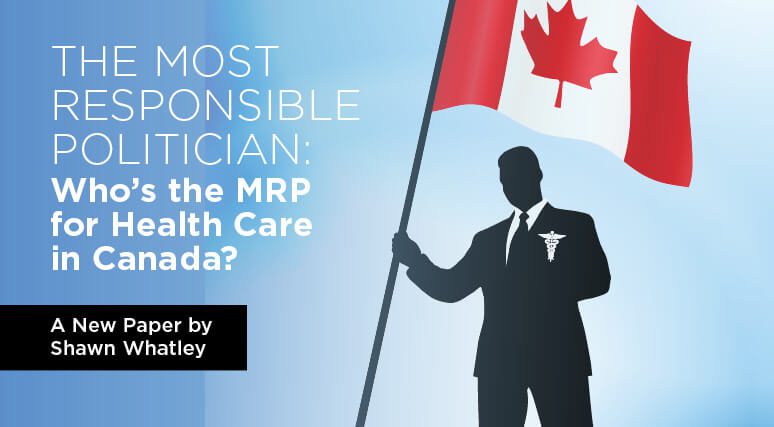 OTTAWA, ON (August 19, 2019): In a study released today by the Macdonald-Laurier Institute, Munk Senior Fellow and former Ontario Medical Association president Dr. Shawn Whatley calls for a national discussion about the level of government responsible for health care in this country, and proposes reforms that make political decision-makers more accountable to patients and voters.
OTTAWA, ON (August 19, 2019): In a study released today by the Macdonald-Laurier Institute, Munk Senior Fellow and former Ontario Medical Association president Dr. Shawn Whatley calls for a national discussion about the level of government responsible for health care in this country, and proposes reforms that make political decision-makers more accountable to patients and voters.
As Dr. Whatley explains in the paper, titled “The Most Responsible Politician”, in medicine, the Most Responsible Physician or Practitioner (MRP) is ultimately responsible for overseeing the care of an admitted patient. Responsibility for clinical decisions and for a patient’s ultimate outcome falls on the MRP. Any ambiguity around MRP creates the potential for bad patient outcomes.
According to Dr. Whatley, the MRP concept does not just apply to medicine. It applies to all leadership scenarios: “We need one person or governance unit to take responsibility for important issues,” he says. “When it comes to political oversight and accountability for the Canadian health care ‘system,’ we might expand the MRP definition and ask: Who is the Most Responsible Politician for Canadian health care?”
Canadian health care routinely ranks poorly against comparable OECD nations. But who should bear the blame for mediocre performance? On one hand, the Constitution appears to support the notion that health care is an exclusive provincial responsibility. On the other hand, the federal government uses its spending power and legislative authority, based on the Constitution, to shape health care through the Canada Health Act (CHA) and Canada Health Transfer (CHT) payments.
The paper quotes Gregory Marchildon, who writes that “provincial governments have assumed the primary responsibility and authority for public health care. At the same time, the Government of Canada, by using [its] ‘spending power’ … has exerted considerable influence over Medicare.” Needless to say, as researchers Michael Smart and Richard Bird have noted, “The result of this fiscal churning is that no government has clear responsibility for delivering key programs and both sides readily blame the other when something goes wrong.”
In the face of this wrangling, patients can end up paying the price. Identifying a Most Responsible Politician for health care might be the answer. Dr. Whatley’s paper examines the history of the Canadian health care system, the relevant Constitutional debates, and more recent legislation. It determines that “a decentralized approach that brings the administration of care closer to the patient, and allows for a variety of approaches that suit the particular needs of patients in different provinces, is preferable to a top-down system dictated by the federal government.”
Once we’ve identified the Most Responsible Politician, how do we give the appropriate level of government the resources and the responsibility to ensure the job gets done? One place to start could be by reforming the health transfer and allowing for provinces to raise their own revenue for health programs, with fewer strings attached.
Dr. Whatley refers to a proposal by Ken Boessenkool, who explores options to implement a significant reduction in federal transfer payments to match a GST tax point transfer. Boessenkool writes that the current approach to funding and managing health care creates confusion “about which level of government is responsible for health care. This confusion is not costless: it allows the provinces to shift the blame to Ottawa when they make mistakes and allows Ottawa to claim credit for reforms it had nothing to do with.”
Conveniently, the CHT stood at $36.1 billion in 2016-17. The GST brought in $34.4 billion for 2016-17. Instead of having the federal government collect $34.4 billion in GST and then transfer $36.1 billion to the provinces, it seems reasonable to consider having the provinces collect the GST and stop the CHT payments, although some transfer arrangement would still be required for provinces with the smallest tax bases.
“If we asked patients, they would probably place more weight on access to quality patient care than on the vague ideals in the CHA or the details of CHT payments” says Dr. Whatley. “Bad things happen when admitted patients do not have a Most Responsible Physician. The same concept applies to health care at a system level. As it stands, the lack of clarity about which level of government carries responsibility for improving health care performance makes difficult change almost impossible.”
To read the full report, click here.
***
Dr. Shawn Whatley is a Munk Senior Fellow at the Macdonald-Laurier Institute, past President of the Ontario Medical Association (OMA) and has wide-ranging knowledge and experience in the field of health care policy. He is also the author of the highly-praised book on how to fix emergency wait times in Canada, No More Lethal Waits. At present, he runs a small rural family practice and is a frequent commentator on health issues in Canada.
To arrange an interview, media are invited to contact:
Brett Byers-Lane
Communications and Digital Media Manager
613-482-8327 x105
brett.byers-lane@macdonaldlaurier.ca




